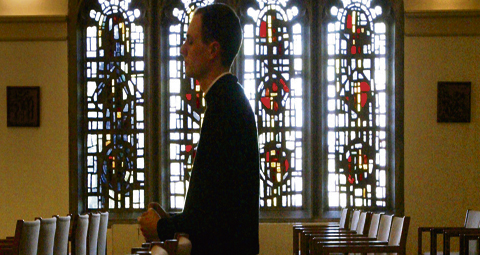February 14 | ![]() 0 COMMENTS
0 COMMENTS ![]() print
print

The stronger the resistance, the richer the final harmony
By Fr Ronald Rolheiser
SOMETIMES while presiding at the Eucharist or preaching, I scan the faces in the front pews. What do they reveal? A few are eager, attentive, focused on what’s happening, but a goodly number of faces, particularly among the young, speak of boredom, of dram duty, and of a resignation that says: I have to be in the church just now, though I wish I was elsewhere.
These reactions are, of course, understandable. We’re human after all, flesh and blood, and when we try to focus on the world of spirit or on what relativises flesh and blood, mortality and self-sacrifice, we can expect that most times the reality of this life will trump the promise of other world.
Sometimes, gazing at those faces staring back at me in church, I’m reminded of a scene that Virginia Woolf describes in her novel, The Waves. The scene is a chapel in a boarding school in England where one of the churchwardens is giving the students a spiritual admonition during a worship service. This particular churchwarden isn’t really respected by the students, but that’s not the deepest reason why one student, Neville, is put off by his words, and by what’s happening in general in that worship service. Something inside him is in resistance, not just against the words of this particular churchwarden, whom he disrespects, but against the very world of which this churchwarden is speaking. In essence, young Neville’s blood is too warm at that moment to find palatable any words that speak of contingency, mortality, abnegation, the cross, silence, or of the other world; instead his youthful blood is silently pressuring for the opposite, health, youth, sex, companionship, status, fame, and pleasure.
And so he seeks a distraction. He doesn’t want to see the churchwarden’s face, hear his words, hear about God, hear about the afterlife, be reminded of human mortality or hear of sacrifice. Like a drug addict, he needs a fix and, in his case, that means fixating on something powerful enough to be religious, powerful enough to match the other world’s offer of eternal life, something worthy of the admiration that he somewhere knows he needs to give to somebody. And he knows exactly where to look. He fixes his gaze and his admiration on the one person in that chapel, a young man named Percival, who, to his youthful mind, is a true incarnation of life and a god worthy of being worshipped. Here’s how Ms Woolf describes it: “The brute menaces my liberty, said Neville, when he prays. Unwarmed by imagination, his words fall cold on my head like paving stones, while the gilt cross heaves on his waistcoat. The words of authority are corrupted by those who speak them. I gibe and mock at this sad religion, at these tremulous, grief-stricken figures advancing, cadaverous and wounded… Now I will lean sideways as if to scratch my thigh. So I will see Percival. There he sits, upright among the smaller fry. He breathes through his straight nose rather heavily. His blue and oddly inexpressive eyes are fixed with pagan indifference upon the pillar opposite. He would make an admirable churchwarden. He should have a birch and beat little boys for misdemeanours. He is allied with the Latin phrases on the memorial brasses. He sees nothing; he hears nothing. He is remote from us all in a pagan universe. But look how he flicks his hand to the back of his neck. For such gestures one falls hopelessly in love for a lifetime.”
I cite this description with more than a little sympathy because I too was once that young boy, Neville, sitting in various religious settings with my heart and mind in resistance, quiet outwardly, squirming inwardly, because I did not want to hear or acknowledge anything that did not, to my mind, honour the reality I felt so undeniably inside my own blood. I didn’t want to be reminded that my health was fragile, that my youth was passing, that this life wasn’t central, and that we weren’t supposed to be thinking so much about sex. I didn’t want to hear about mortality, that we will all die sometime; I didn’t want to hear about the Cross, that it’s only by dying that we come to life; and I didn’t want to be asked to focus attention on the other world, I wanted this world. I accepted that the church was important, but, for me, the sports arena was more real and more alluring. And, like young Neville, I too had my Percivals, certain peers, certain sports idols, and certain film stars whose enviable bodies and perfect gestures were the life and immortality I, in fact, yearned for and whose lives didn’t seem to have the limits of my own.
But, I think, God likes this kind of youthful resistance, and built it into us. Why? Because the stronger the resistance, the richer the final harmony.
—Fr Ronald Rolheiser is a Catholic priest and member of the Missionary Oblates of Mary Immaculate. He is president of the Oblate School of Theology in San Antonio, Texas. Visit his website: www.ronrolheiser.com











